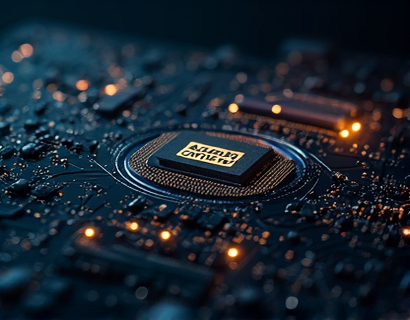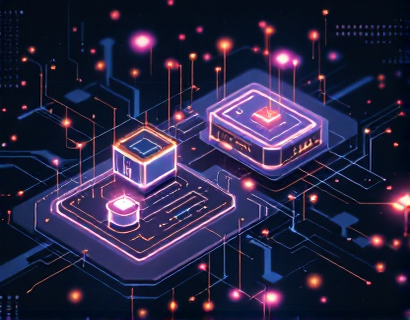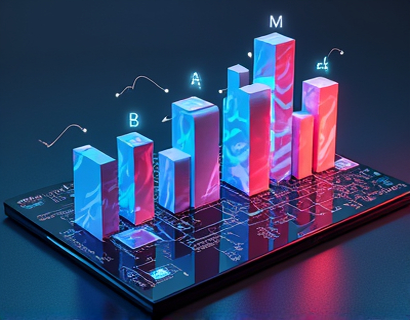Oracle Management and Blockchain Service Optimization: Empowering Decentralized Applications with Advanced Data Integration and Smart Contract Solutions
In the rapidly evolving landscape of blockchain technology, the integration of reliable oracle management and seamless blockchain service access stands as a critical factor for the success of decentralized applications. This article delves into the innovative software solutions that are transforming the way developers and businesses interact with blockchain ecosystems. By focusing on advanced data integration and smart contract capabilities, these solutions ensure secure and efficient operations, unlocking the full potential of blockchain technology.
Understanding Oracle Management in Blockchain
Oracle management in the context of blockchain refers to the process of integrating external data sources into the blockchain network. These external data sources, or oracles, play a vital role in providing real-time and accurate data to smart contracts, enabling them to make informed decisions and execute tasks autonomously. However, the traditional approach to oracle management often faces challenges such as data latency, security vulnerabilities, and limited scalability.
To address these issues, advanced oracle management solutions have emerged, focusing on streamlining data integration and enhancing the reliability of smart contract interactions. These solutions leverage cutting-edge technologies to ensure that data from various sources is accurately and securely fed into the blockchain, thereby supporting the seamless operation of decentralized applications.
Key Features of Advanced Oracle Management Solutions
1. Real-Time Data Integration: Advanced oracle management platforms provide real-time data feeds from multiple sources, ensuring that smart contracts have access to the most up-to-date information. This capability is crucial for applications that require timely data, such as financial trading platforms and supply chain management systems.
2. Enhanced Security: Security is paramount in blockchain operations. Advanced solutions implement robust encryption and authentication mechanisms to protect data integrity and prevent unauthorized access. This ensures that the data fed into smart contracts is not only accurate but also secure from tampering and cyber threats.
3. Scalability and Flexibility: As blockchain networks grow, oracle management solutions must scale accordingly. Advanced platforms are designed to handle large volumes of data and support multiple data sources, making them suitable for both small-scale and enterprise-level applications. Additionally, these solutions offer flexible integration options, allowing developers to easily incorporate various data feeds into their smart contracts.
4. Multi-Chain Support: With the proliferation of different blockchain platforms, an advanced oracle management solution must support multiple chains. This ensures that developers can seamlessly integrate data from various blockchains, fostering interoperability and expanding the scope of decentralized applications.
Optimizing Blockchain Service Access
Beyond oracle management, optimizing access to blockchain services is essential for the efficient operation of decentralized applications. This involves not only integrating oracles but also ensuring that smart contracts can interact with other blockchain services such as wallets, exchanges, and decentralized finance (DeFi) protocols.
Advanced software solutions facilitate this by providing a unified interface for accessing various blockchain services. These platforms abstract the complexities of blockchain interactions, allowing developers to focus on building robust and innovative applications without delving into the intricacies of blockchain APIs and protocols.
Unified API Access
One of the key features of optimized blockchain service access is the provision of unified APIs. These APIs simplify the process of interacting with multiple blockchain services, reducing development time and minimizing errors. Developers can use these APIs to perform tasks such as sending and receiving cryptocurrencies, managing wallet addresses, and executing smart contracts, all within a single, streamlined interface.
Automated Data Synchronization
Another critical aspect is automated data synchronization. Advanced solutions ensure that data from oracles and other sources is automatically updated in real-time within the blockchain network. This eliminates the need for manual data updates and reduces the risk of data discrepancies, thereby enhancing the reliability of decentralized applications.
Cost Efficiency
Optimizing blockchain service access also contributes to cost efficiency. By streamlining interactions and reducing the complexity of blockchain integrations, these solutions help lower transaction fees and computational costs. This is particularly beneficial for businesses looking to deploy blockchain-based solutions on a large scale, as it helps maintain profitability and competitiveness.
Enhancing Smart Contract Functionality
Smart contracts are the backbone of decentralized applications, executing predefined actions based on specific conditions. However, their full potential is often limited by the quality and reliability of the data they receive. Advanced oracle management and blockchain service optimization directly impact smart contract functionality by providing high-quality, real-time data.
1. Improved Decision-Making: With access to accurate and timely data, smart contracts can make more informed decisions. For example, in automated insurance systems, real-time data on weather conditions can trigger claims more efficiently and fairly.
2. Enhanced User Experience: Users interacting with decentralized applications benefit from smoother and more responsive interactions. Real-time data updates ensure that the application state reflects the current conditions, leading to a more intuitive and user-friendly experience.
3. Increased Trust and Adoption: Reliable data and secure smart contract executions build trust among users and developers. As more robust and trustworthy decentralized applications emerge, the adoption of blockchain technology across various industries is likely to accelerate.
Case Studies and Real-World Applications
To illustrate the impact of advanced oracle management and blockchain service optimization, consider a few real-world applications:
- Decentralized Finance (DeFi): In the DeFi space, platforms like Aave and Compound utilize advanced oracle solutions to integrate price feeds and market data. This enables automated lending and borrowing services to adjust interest rates and execute trades based on real-time market conditions.
- Supply Chain Management: Companies like IBM and Maersk have developed blockchain-based supply chain solutions that use oracles to track product movements and verify authenticity. Real-time data integration ensures transparency and traceability, reducing fraud and improving efficiency.
- Digital Identity Verification: Blockchain-based identity verification systems use oracles to integrate with government databases and other identity sources. This ensures that user identities are accurately and securely verified, facilitating seamless authentication processes.
Future Trends and Innovations
The landscape of oracle management and blockchain service optimization is continually evolving, driven by technological advancements and increasing demand for decentralized solutions. Some key trends to watch include:
- Interoperability Protocols: As more blockchain platforms emerge, interoperability protocols will become increasingly important. These protocols will enable seamless data and asset transfers between different blockchains, enhancing the versatility of decentralized applications.
- AI and Machine Learning Integration: The integration of artificial intelligence and machine learning with blockchain technology is set to revolutionize data processing and analysis. Advanced oracle solutions may incorporate AI algorithms to predict data trends and optimize smart contract executions.
- Regulatory Compliance: As blockchain adoption grows, regulatory frameworks will evolve. Oracle management and blockchain service optimization solutions will need to adapt to ensure compliance with new regulations, maintaining the legal and operational integrity of decentralized applications.
In conclusion, advanced oracle management and optimized blockchain service access are pivotal for the success of decentralized applications. By providing real-time, secure, and scalable data integration and smart contract capabilities, these solutions unlock the full potential of blockchain technology. As the ecosystem continues to mature, developers and businesses can expect even more innovative solutions that further enhance the efficiency and reliability of blockchain-based systems.










































